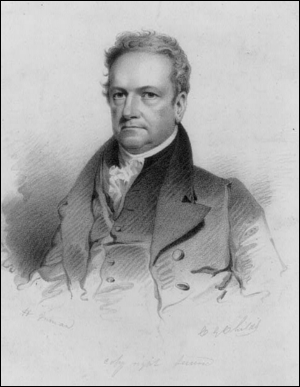1769-1828
De Witt Clinton was born on March 2, 1769, in Napanock, Ulster County, NY. He was educated at the Kingston Academy and King’s College (now Columbia University). Clinton studied in the law office of noted attorney Samuel Jones, Sr.,and became a life-long friend with a fellow student and later Chancellor of New York, Samuel Jones, Jr. Admitted to the bar in 1790, he commenced practice in New York City.
In 1787 and 1788, De Witt Clinton authored newspaper articles opposing the ratification of the Federal Constitution and, in 1789, Clinton was appointed private secretary to the New York Governor, his uncle, George Clinton.
De Witt Clinton was elected to the New York Assembly in 1797, and to the New York Senate in 1798. He became a member of the Council on Appointment in 1801, and was chosen to fill a vacant seat in the U.S. Senate in 1802. There, he advocated for the 12th Amendment to the Constitution. In 1803, Clinton became Mayor of New York City, serving until 1815 with the exception of two annual terms. In the Mayor’s Court, he presided over two landmark cases, the New York City Cordwainers Case (1810) and People v Philips (1813). Cordwainers is a labor law case in which a group of shoemakers demanding higher wages for piece work were found guilty of common law conspiracy. The Philips case is the earliest known American case on freedom of religion and the priest-penitent evidentiary privilege in American law. It was from this case that Justice William Van Ness drew a distinction in his ruling in People v. Christian Smith.
Clinton was a man of great intellect, and was accomplished in both belle-lettres and science. He published many articles that were well received, and he was honored by membership in the learned institutions in the United States, Great Britain and several countries in continental Europe. In 1812, he was honored by Queens College (now Rutgers) with an honorary degree of Doctor of Laws and in 1824, he was similarly honored by the trustees of his alma mater, Columbia College.
Clinton served as New York State Senator from 1806 to 1811, and as Lieutenant Governor from 1811 to 1813. A strong advocate for a State canal between the Hudson River and Lake Erie, De Witt Clinton became one of the canal commissioners in 1810 and, in 1816, the New York Legislature adopted Clinton’s canal plan. The following year, Clinton was elected Governor of New York, and was reelected in 1820. He did not run in 1822 due to internal party disputes, but was again elected Governor in 1824, providing him with the pleasure of presiding over the 1825 celebration of the opening of both the Champlain and the Erie Canals. Again reelected Governor in 1826, he died in office on February 11, 1828.
Source
J. Seymour. Memoir of De Witt Clinton (1829).

